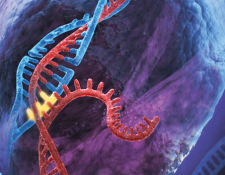CRISPR causes serious DNA damage with high frequency – but it’s often overlooked
By Claire Robinson,
GMWatch
| 08. 09. 2023
The latest in a long series of papers has been published, detailing unintended effects of CRISPR gene editing. The new review summarises the many types of serious unintended on-target (at the intended edit site) DNA damage resulting from CRISPR/Cas gene editing.
The review appears as the European Commission and the UK government maintain their pretence that gene editing is a precise, predictable, and controllable technique and that food plants made with this technology are therefore as safe as those produced by conventional breeding.
The authors of the new paper, from Rice University in the US, reviewed the literature on CRISPR gene editing in human, primate, and mouse cells. They found that CRISPR-induced double-strand breaks in the DNA caused numerous large unintended on-target genetic damages, including large and small deletions and insertions, and chromosomal rearrangements of genetic material. And they note that even large on-target gene modifications are not detectable by standard methods.
Because the unintended effects of CRISPR gene editing highlighted in the new review are on-target mutations at the intended edit site, improving the targeting of the editing tool...
Related Articles
By Anumita Kaur [cites CGS’ Katie Hasson], The Washington Post | 03.25.2025
Genetic information company 23andMe has said that it is headed to bankruptcy court, raising questions for what happens to the DNA shared by millions of people with the company via saliva test kits.
Sunday’s announcement clears the way for a new...
By Peter Wehling, Tino Plümecke, and Isabelle Bartram
| 03.26.2025
This article was originally published as “Soziogenomik und polygene Scores” in issue 272 (February 2025) of the German-language journal Gen-ethischer Informationsdienst (GID); translated by the authors.
In mid-November 2024, the British organization Hope not Hate published its investigative research ‘Inside the Eugenics Revival’. In addition to documentating an active international “race research” network, the investigation also brought to light the existence of a US start-up that offers eugenic embryo selection. Heliospect Genomics aims to enable wealthy couples to...
By Frank Landymore, Futurism | 03.18.2025
You can only throw so much money at a problem.
This, more or less, is the line being taken by AI researchers in a recent survey. Asked whether "scaling up" current AI approaches could lead to achieving artificial general...
By Craig S. Smith, Forbes | 03.08.2025
One recent evening in Shenzhen, a group of software engineers gathered in a dimly lit co-working space, furiously typing as they monitored the performance of a new AI system. The air was electric, thick with the hum of servers and...




